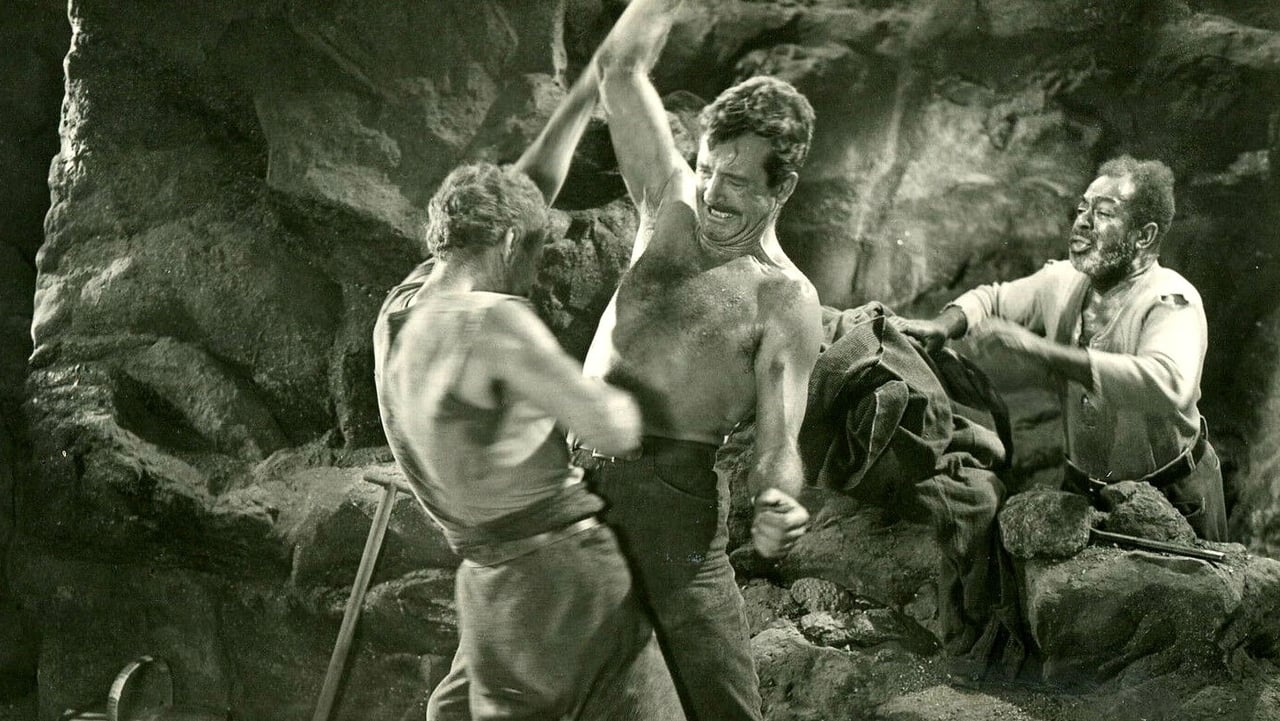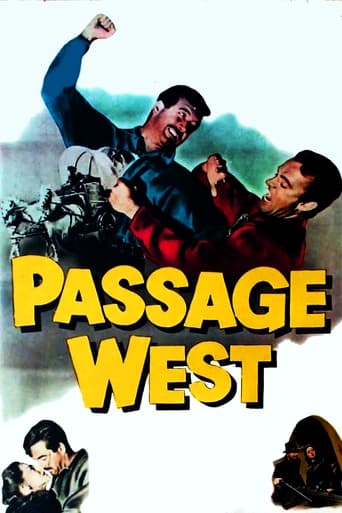



disgusting, overrated, pointless
This is a must-see and one of the best documentaries - and films - of this year.
View MoreAmazing worth wacthing. So good. Biased but well made with many good points.
View MoreBlistering performances.
I've seen many movies starring John Payne and Dennis O'Keefe and I have to say I found their performances in PASSAGE WEST among the strongest of their careers. Payne plays a hardened escaped convict serving time for murder, who leads a pack of five other runaway cons in taking over a wagon train of settlers heading to California. The leader of the train is a minister played by O'Keefe, who is first seen conducting a funeral service for a boy who died during the journey. Payne runs roughshod over the wagon train and jeopardizes the settlers' lives with some rash commands, earning O'Keefe's undisguised contempt. Gradually, however, the men's relationship shifts, eventually reaching a point of trust and grudging respect. The turning point is a grueling fistfight between the two (the film's only action scene), a battle that is quite rough and messy, like a real fight and not a cleanly choreographed western brawl like we'd normally find in such films. O'Keefe even executes a few unusual moves that might seem out of place in the west of 1863, but are explained, in a clever bit of dialogue after the fight, as something he learned in a lumberjack camp and as a waterfront saloon bouncer in an earlier life before he found God.The settlers are played by dependable character actors who come across as plausible migrants from the east seeking a better life. Only Arleen Whelan's character, a preacher's daughter who falls hard for Payne after he forces a kiss on her, smacks of Hollywood contrivance, but she plays the role with conviction and redheaded fury, with a layer of seething discontent just below the surface, and I found myself believing her, despite the cliché. In the final film of his career, Dooley Wilson, best known for playing singer-pianist Sam in CASABLANCA, plays a runaway slave among the convicts. The script briefly touches on his status when the group learns of Lincoln's Emancipation Proclamation, but otherwise steers clear of racial issues. Other than a handful of interior scenes, the bulk of the film was shot on location and has the actors enduring a sandstorm, desert heat, rain and deep pockets of mud, among other hardships. This has some thematic similarities with another excellent underrated western of 1951, THE SECRET OF CONVICT LAKE, in which Glenn Ford leads a group of escaped cons into a snowbound mountain settlement populated almost entirely by women, whose men have left town to work a silver mine, leading to a series of uneasy encounters as the women take great pains to keep the convicts from getting the upper hand.
View MoreA very entertaining western with great supporting cast to the stars. Ned Young and Lewis Foster (who also directed) wrote an interesting script and the outcome was quite enjoyable. Frank Faylen was great as a badman in a supporting role. John Payne, Dennis O'Keefe and Arlene Whelan performed well in the star roles. Payne leads a group of escaped convicts that take a religious group bound west as hostage, with the usual conflicts between the two factions as well as within each group rising out of the situation. Richard Rober, Dooley Wilson, Paul Fierro, Faylen, Payne and one other unidentified actors play the convicts very well; O'Keefe, Whelan, Peter Hansen, Mary Anderson, Richard Travis, Griff Barnett do well as the people taken hostage. A good fight scene between Payne and O'Keefe, and a touching scene with one of the women singing to a doll in a cradle after her baby dies add to the stories impact. Recommended.
View MoreWhile not a notable piece of film-making, this modest western offers so many satisfactions and surprises that it almost merits the designation of "undiscovered gem." After an opening sequence that quickly and efficiently sets up the story, we learn that John Payne will, unexpectedly, play the movie's "bad guy." He's a killer who seems to take grim pleasure in the fact that his escape from prison resulted in the deaths of three guards. There's no attempt to soften his image by suggesting he'd been unjustly convicted and there's no plea for sympathy by, for example, showing a back cruelly scarred by an overseer's whip.After taking over Dennis O'Keefe's wagon train, Payne seems drawn to leading lady Arleen Whelan but aside from one passionate kiss in a rainstorm, the standard romance between these two never develops. What's more, Whelan's character defies what would have ordinarily been a "goody-goody" role. She's by turns cynical, sullen, and selfish and she never becomes particularly likable.Dooley ("Casablanca") Wilson also appears in the cast at a time when black faces were rarely featured in movies in general and in westerns in particular.As the wagon train that Payne and his cohorts take over makes its way to California, the usual hardships occur but they seem a bit starker than usual. A baby dies from lack of milk, its mother drifts into madness, a calf greatly valued by its elderly owners breaks its leg and must be destroyed, a schoolteacher's prize collection of seedlings gets tossed by the side of the road, a father must bury his child. Only at the end of their journey do these pioneers find any respite from their troubles but then there's an explosion inside a tunnel which results in a death and a shift in relationships few would have expected at the start of the movie.Since Lewis Foster's work classifies him as little more than a journeyman director, the unique qualities of "Passage West" can probably be ascribed to the script co-written by the blacklisted writer, Alvah Bessie. Loyal Griggs, who later won an Oscar nomination for "The Ten Commandments," provides the cinematography which is heavily slanted toward exterior shots. In fact, the first interior, (a saloon), comes at the movie's three-quarters mark.John Payne, with an uncharacteristic mustache, and Dennis O'Keefe work together much better here than in their earlier "The Eagle and the Hawk" but minor actress Arleen Whelan can do little with the intriguing but sketchily-drawn figure of "Rose." As might be expected -- most notably in the tunnel sequence -- Payne gets a chance to shed his shirt revealing that thatch of chest-hair he had to shave off during his clean-cut and boyish days back in the 1940s.
View MoreAlthough this Western starts with some good ideas, based on a not particularly important book by Alvah Bessie & Nedrick Young (who were both at the Hollywood's black list, having been accused for Communist sympathies), the script fails to develop them further. The production is cheap, the directory typical for the genre and without signs of imagination, while the actors and actresses are incapable to blow life in the characters. I have given it 3 out of 10.
View More